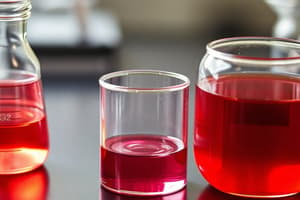Podcast
Questions and Answers
Suggest a way to determine whether a colorless liquid is pure water or a salt solution without tasting it.
Suggest a way to determine whether a colorless liquid is pure water or a salt solution without tasting it.
Boil all the water away and if there is a residue, it is most likely a salt solution.
What distinguishes a mixture from an impure substance?
What distinguishes a mixture from an impure substance?
If a substance contained primarily one component, it's an impure substance; if it has similar amounts of several components, it's a mixture.
Define the process of sublimation.
Define the process of sublimation.
When a solid passes directly into a gaseous state and back to a solid state without appearing in liquid state.
How do decantation and filtration differ, and which should be faster?
How do decantation and filtration differ, and which should be faster?
Why should you never place a hot object on the pan of a balance?
Why should you never place a hot object on the pan of a balance?
How did this experiment illustrate the principle of conservation of mass?
How did this experiment illustrate the principle of conservation of mass?
How could you separate zinc chloride from SiO2?
How could you separate zinc chloride from SiO2?
Why is the NaCl extracted with water three times as opposed to only once?
Why is the NaCl extracted with water three times as opposed to only once?
A student found that her mixture was 13% NH4Cl, 18% NaCl, and 75% SiO2. Assuming that her calculations are correct, what did she most likely do incorrectly in her experiment?
A student found that her mixture was 13% NH4Cl, 18% NaCl, and 75% SiO2. Assuming that her calculations are correct, what did she most likely do incorrectly in her experiment?
Study Notes
Determining Purity of a Liquid
- To identify if a colorless liquid is pure water or a salt solution, boil the liquid; presence of residue indicates a salt solution.
Mixture vs. Impure Substance
- An impure substance primarily contains one component, whereas a mixture has comparable amounts of multiple components.
Sublimation Process
- Sublimation refers to the transition of a solid directly into a gas and back to solid without becoming liquid.
Decantation vs. Filtration
- Decantation involves pouring off liquid from solids, while filtration passes liquid through a filter, leaving solids behind.
- Decantation is generally faster since it doesn't require additional substances.
Balance and Hot Objects
- Placing a hot object on a balance can create buoyancy effects, appearing to reduce the object's mass.
Conservation of Mass Principle
- The conservation of mass is illustrated by recovering all original sample components, where the total mass of NH4Cl, SiO2, and NaCl equals the initial sample mass, within experimental error.
Separation of Zinc Chloride and SiO2
- Zinc chloride is soluble and will dissolve in the filtrate during separation, leaving SiO2 as a residue.
Extraction Process of NaCl
- NaCl is extracted with water three times to maximize extraction efficiency; each extraction provides approximately 50% recovery (e.g., first extraction: 50%, second: 75%).
Error in Mixture Composition
- A student reporting a mixture composition of 13% NH4Cl, 18% NaCl, and 75% SiO2 likely failed to properly filter the mixture, affecting substance separation and drying.
Studying That Suits You
Use AI to generate personalized quizzes and flashcards to suit your learning preferences.
Description
Test your knowledge on the separation of mixtures and the properties that distinguish mixtures from pure substances. This quiz covers methods to identify liquids and the definitions pertaining to mixtures and impurities. Perfect for chemistry lab students!





